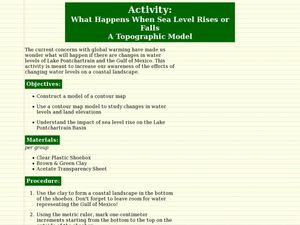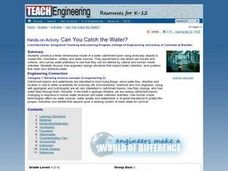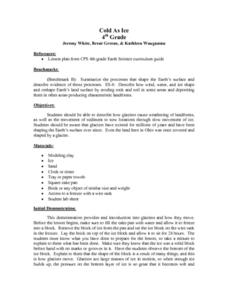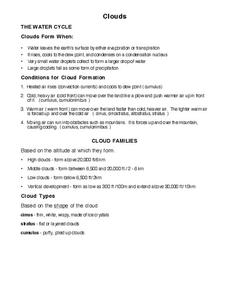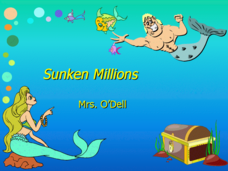K5 Learning
Landforms
Valleys, mountains, and plateaus are just a few geographic landforms on our Earth. Read about these types and more in a brief landform passage. After reading, learners respond to six short answer comprehension questions.
Curated OER
Coasts and Reefs: Shallow Marine Processes
A more thorough presentation on coastal systems would be difficult to find! Detailed diagrams illuminate the offshore, shoreface, foreshore, and backshore zones of beach. The sources and movement of sediments along the coastline are...
Curated OER
What Happens When Sea Level Rises or Falls
Students examine the impact of sea level on land formations. In this geography and map lesson, students construct a contour map model illustrating how much of the clay "coastline" is covered as water is added. Metric measurement is...
Curated OER
Landforms of Illinois
Students discover the primary landforms of Illinois. They examine how those landforms were formed as well. In groups, they research one of the landforms from their vocabulary list. They create their landform in a shoebox and present it...
Curated OER
Can You Catch the Water?
Students work together to construct a model of a water catchment basin. They survey water patterns and complete experiments to see where rain travels and collects. They discover how engineers design structures that help with drainage.
Curated OER
I Love the Mountains
First graders discuss and define different landforms. They read the book "Our Land", sing a landform song and perform it with motions and then complete a worksheet.
Curated OER
Bhutan, the Last Shangri-La: Sandwich Squash: How the Himalayas Were Formed
Students create and record a model of mountain formation. They identify major mountain building formations. Students understand how the Himalaya Mountains were formed, why they are located near Bhutan, and why they are becoming larger.
Curated OER
Landforms By Hand: Geography, Map Skills
Students experiment with landform vocabulary by using their own hands and a bar of soap as media.
Lakeland Central School District
Erosion and Deposition
If you are looking for a straightforward presentation about erosion and deposition with an emphasis on rivers, look no further. While not super flashy or entertaining, vocabulary is presented simply and accompanied by pictures to...
Curated OER
How Islands Form
Middle schoolers how islands form, rising water levels, growth of coral, and volcanoes. They complete Island Investigation worksheets after researching island formation on various Internet websites.
Curated OER
Sinkholes in a Cup
Young scholars create sinkholes and learn about the formation of sinkholes by using water, a foam cup, sugar, sand, and a sponge. For this sinkholes lesson plan, students also answer short answer questions.
Curated OER
Rain On
Fourth graders study the water cycle and clouds. In this water cycle and cloud lesson, 4th graders determine the definition of condensation and watch a demonstration in which the teacher makes a cloud in a bottle. They discuss the water...
Curated OER
How Volcanoes Grow
Students study volcanoes including rock fragments, ash, aerosols and gases. In this volcano lesson students divide into groups and build models of the three major types of volcanoes.
NOAA
The Dead Zone
The fifth installment of a 23-part NOAA Enrichment in Marine sciences and Oceanography (NEMO) program defines dead zones and how they form. Pupils then examine data from the Gulf of Mexico to determine dead zone formation.
Curated OER
First Land Plants Found on Earth
In this first land plants worksheet, students read about the major events that allowed plants to evolve on Earth. Students read about the primary and secondary atmospheres, the formation of the ozone layer to protect from UV light and...
Curated OER
Cold As Ice
Fourth graders investigate how glaciers cause the weathering of landforms. They observe a brick that has been placed on a frozen slab of ice, and discuss the results, comparing them to the movements of a glacier. In small groups, they...
K5 Learning
The Bonfire in the Sea
Ever wonder why fish disappear from the surface of the water in cold weather? Fifth graders read a fun story about the magical fish tribe and their underwater bonfire before answering four comprehension questions.
NOAA
Into the Deep
Take young scientists into the depths of the world's ocean with the second lesson of this three-part earth science series. After first drawing pictures representing how they imagine the bottom of the ocean to appear, students investigate...
Curated OER
Clouds
In this science worksheet, students look for the meaning of the water cycle and its relation to the formation of clouds. They read the information about the different types of clouds.
Curated OER
Shaping the Land
In this shaping the land activity, students will match 7 vocabulary words relating to the movement of sediments to its definition. Students will read 10 statements about how water and glaciers impact sediment movement and answer true or...
Curated OER
Sunken Millions
This PowerPoint provides a game show format with multiple choice questions about fresh and salt water. Topics include sources of water, water geography, uses of water, and the water cycle.
Biology Junction
Seed Plants: Gymnosperms and Angiosperms
One of the reasons plants found success on land relates to seed development. Scholars learn about many different forms of seeds and how they changed over time. It describes the structure and function of many different types of seeds in...
Curated OER
Weathering Landforms
Fifth graders brainstorm a list of ways the Earth's surface can change. As a class, they are introduced to the concepts of erosion and weathering and discover how wind and water cause changes to the surface of the Earth. To end the...
Curated OER
Google Earth Geology Field Trip
Students take a virtual field trip around California using Google Earth. For this geology field trip lesson, students explore landforms and a variety of rocks located in California. Students compare environments where rocks are formed....




